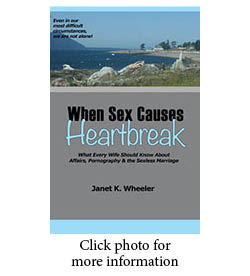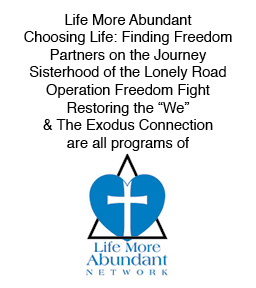Today’s post is the last in our “crazy train” series. The other posts start here.
If, after reading these articles, you are reasonably convinced that you are suffering from Post Traumatic Stress Disorder, you can probably see how it has disrupted every corner of your life. Not only does it dramatically reduce our energy, but it can cause problems in our jobs, relationships, health and even our ability to find enjoyment in life. PTSD even increases the risk of other serious struggles like:
• Depression and Anxiety
• Drug or alcohol abuse or addiction
• Eating disorders
• Suicidal thoughts and actions
Many women mistakenly believe that if their husbands would just stop pursuing their addictive behaviors, they, themselves, would quickly recover from the trauma those behaviors created. Although it’s true that the husband’s healing would reduce the chance of future re-traumatization, it will not automatically eliminate the damage that has already been done. Even divorce won’t undo the effects of what has already been experienced. There is no magic solution.
That doesn’t mean that there is no hope. Freedom is absolutely available to those who seek it, but it only comes through intentionally working to undo the effects of your husband’s addiction. Because it has touched us so deeply and in so many areas of our lives, the process can take significant time and effort. Healing will need to be pursued in every area that has been compromised. These are likely to include:
PHYSICAL
When our physical or emotional safety feels threatened, the limbic, survival part of our brain is activated. Our body becomes tense and flooded with adrenaline and other stress hormones in preparation for a fight or flight reaction. These body responses were meant to be a short term solution to get us out of harm’s way. When a situation is not quickly resolved, these chemicals actually become detrimental to our physical well-being.
Those who intentionally pay attention to physical self-care have been shown to heal faster from the effects of their husband’s behaviors. Focusing on making healthy choices that include getting more sleep, eating a healthy diet, stretching and exercising and taking warm baths—can, over time, help you move out of that survival mode and allow your body to calm and your mind to think more clearly.
SPIRITUAL
One of the most debilitating aspects of coming face to face with this type of trauma is the overwhelming sense of hopelessness and helplessness that it can create. In the light of such a huge betrayal by someone so close to us, it is not unusual to struggle with the feeling that everyone, sometimes even God, has forsaken us. We don’t know who we can trust. We may not even want to go out or attend church while we’re feeling such intense confusion and vulnerability.
It’s important to remember, however, that being around other people can be extremely healing, even when we choose not to reach out and actually share what we are going through. Meditation, prayer, scripture reading, listening to uplifting music and seeking counsel from trusted, informed church leaders can also help us access a power and strength from beyond ourselves that will help to restore our lost feelings of peace and hope.
EMOTIONAL
Acknowledging and expressing our emotions is especially critical in the early stages of recovery. Trying to ignore strong or confusing emotions in the hopes that they will go away will only keep us stuck in the pain.
No feeling is taboo or inappropriate, but it is important to find a way to express them in a healthy non-aggressive way. Many women find it helpful to keep a private journal in which to record and explore the intense, and often, conflicting emotions that wash over them.
Dealing with trauma is both physically and emotionally exhausting, so look for ways to simplify your life. Slowing down, avoiding new commitments, and focusing on the things that will bring you the greatest peace, joy and satisfaction, will help give you the energy you need to heal.
RELATIONAL
Recovering from the effects of your husband’s addiction requires the same sort of process as dealing with grief and loss. It takes time to work through the anger and sadness that it has caused you and to move forward toward acceptance of a new and different life that may or may not include a husband that is committed to his own recovery.
It is imperative that you connect with a few trusted people that can provide a safe place for you to talk about what you are going through as you walk through this process. These individuals can be trained professionals, close friends, or even family members, as long as you are reasonably convinced that they know how to keep confidences, won’t negatively judge you or your husband, and have enough understanding about this topic to be able to offer truth, support and direction.
With patience, perseverance and the help of God and others, you can find freedom from the torment of the trauma you have experienced.
Hang on to this prayer, until healing comes: Answer me quickly, Lord; my spirit fails. Do not hide your face from me or I will be like those who go down to the pit. Let the morning bring me word of your unfailing love, for I have put my trust in you. Show me the way I should go, for to you I entrust my life.” —Psalm 143:7-8



1 Comment
Cheryle McConnaughey
January 28, 2016These are great! I am amazed that after 20 years of going through all of this that it never gets easier to accept the next time you catch them. It hurts the same and grief is the same. The only difference is since working on recovery I am quicker to run to the Lord and others for support and work through it faster.
Leave A Response